The City of Ocala ensures residents receive award-winning water to their homes every single day through 24-hour monitoring and the efforts of a talented team of more than 30 employees.
When you step into a soothing hot shower at the end of a long day, do you think about where the water comes from? When you pour a refreshing glass of ice water, do you wonder whether it’s safe to drink? No? That’s OK—the City of Ocala has an entire team of water professionals working around the clock to ensure you have a steady supply of safe, clean water.
Award-winning water
The water that flows from faucets in the City of Ocala is pumped directly from the upper Floridan Aquifer at Water Treatment Plant No. 1 (WTP#1), where it is softened, disinfected, filtered and repeatedly tested before it is piped out to homes and businesses. 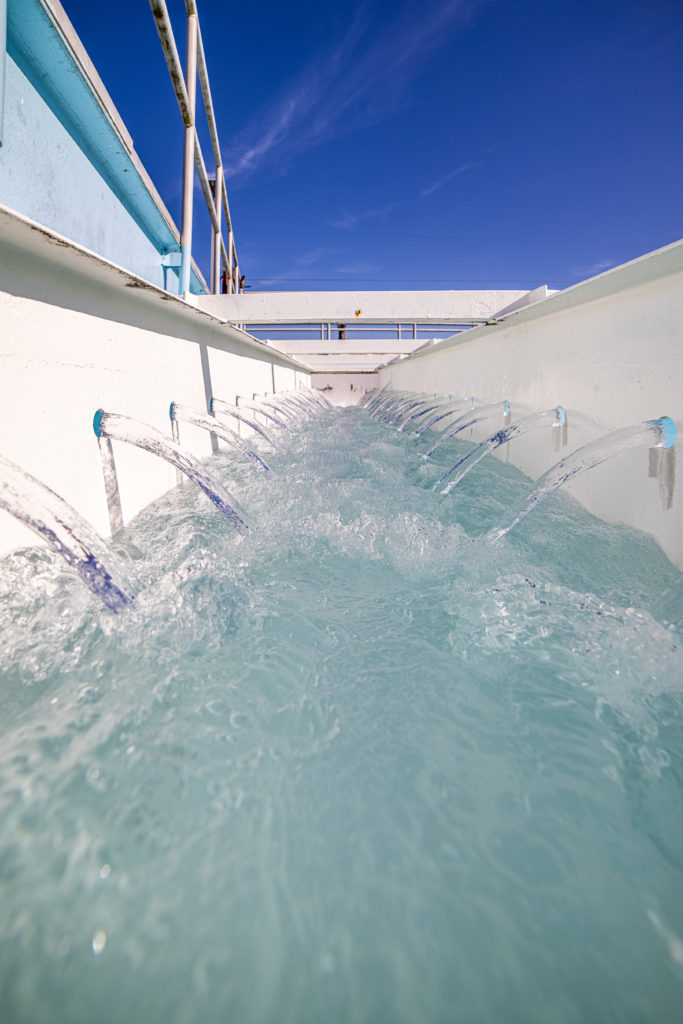 For reference, this aquifer is the same source as the crystal-clear water that flows into Silver Springs. And it’s not just good water—it’s award-winning water. The City of Ocala has won the past two Florida Section of the American Water Works Association’s Region XI Best Tasting Drinking Water Contest.
For reference, this aquifer is the same source as the crystal-clear water that flows into Silver Springs. And it’s not just good water—it’s award-winning water. The City of Ocala has won the past two Florida Section of the American Water Works Association’s Region XI Best Tasting Drinking Water Contest.
“The water we draw from is pristine, housed in the aquifer,” explains Ryan Tassa, the water plant’s Lead Operator. “We soften the water because calcium and magnesium will cause your pipes to eventually clog up due to lime scale. We also disinfect the water and keep a constant pressure in the system.”
Our staff maintain a fine balance, Tassa says, between ensuring our city water meets all safety standards and making sure it smells and tastes pure, without discernable chlorine, for example.
Tassa is one of seven operators who monitor the water plant every minute of every day throughout the year.
“Ever since 1972 there has been someone on duty 24 hours a day, testing, treating and monitoring the water,” he points out.
Operators are constantly monitoring the flow from the five wells, pressure throughout the system and the levels of lime, chlorine and fluoride in the water. Every two hours, water samples are tested for alkalinity, hardness, calcium and chlorine so operators can continually adjust.
Maintenance experts like Systems Equipment Technician III, Tim Maynard, who has more than 27 years of experience, focus on preventative maintenance, cleaning and sustaining all the water plant’s equipment. He keeps a watchful eye over five wells, two ground storage tanks and multiple treatment basins, as well as lime slaker machines and fluoride, chlorine and lime supplies and delivery systems, ensuring optimal working conditions at all times. Maynard, who is on call 24 hours a day to respond to any problems, sees his job as that of a mechanic and is proud to contribute to “getting your glass of water.”
Across the Water Resources Department, 31 Department of Environmental Protection (DEP) certified employees service around 1,400 miles of pipes that distribute drinking water into buildings and carry wastewater away. 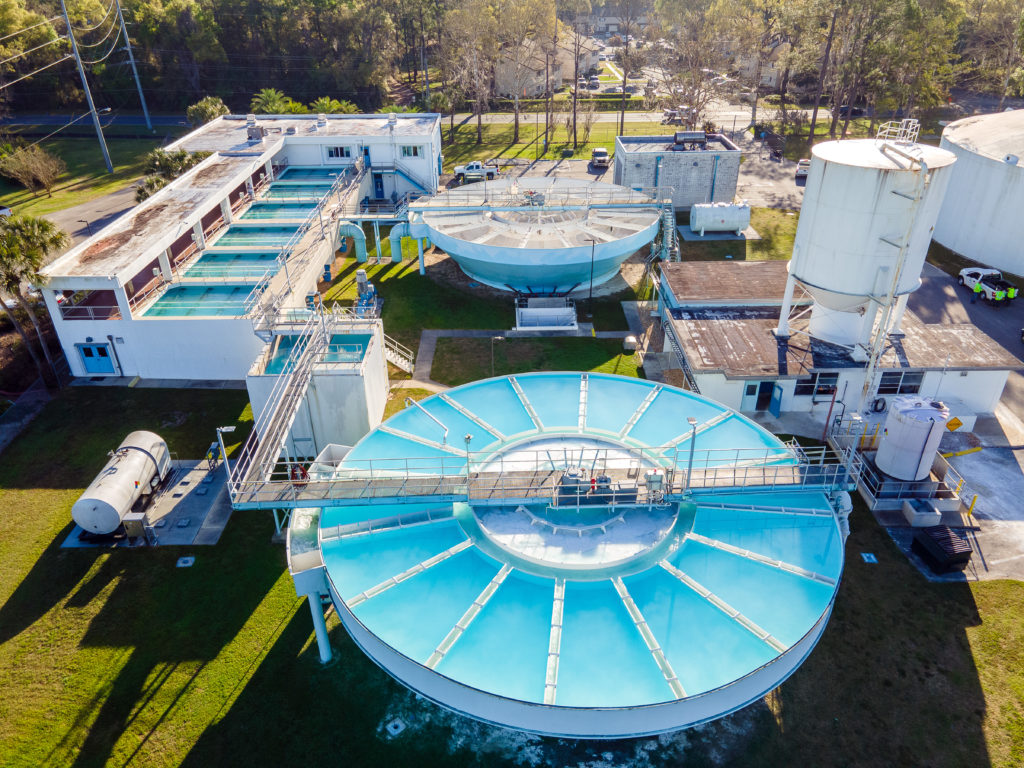 Under the leadership of Richard Knight, Jr., Chief of Central Lines Maintenance, together they work on the 10,000 valves that make up the system whenever there’s a leak or issue and that almost always means getting soaking wet, no matter the weather. Because positive pressure is important to keep contaminants out of the system, they must make repairs while the water continues to flow.
Under the leadership of Richard Knight, Jr., Chief of Central Lines Maintenance, together they work on the 10,000 valves that make up the system whenever there’s a leak or issue and that almost always means getting soaking wet, no matter the weather. Because positive pressure is important to keep contaminants out of the system, they must make repairs while the water continues to flow.
“Unfortunately, they’re getting wet, but it is to make better service for the customers,” Knight explains. “We go above and beyond to make sure the water’s there when you turn on the faucet. We get out there and make sure we do whatever we can do to make the customers as happy as possible.”
Although they don’t miss an opportunity to quote The Waterboy—“Now that’s what I call high-quality H2O!”—the City of Ocala Water Resources Department workers take supplying more than 59,000 residents with clean, safe, good-tasting water seriously. That’s why they want people to understand water is a resource that needs to be protected and conserved.
Saving Water
Do you leave the water running while you brush your teeth? You might be wasting 9 gallons of water every day and not realize it. Do you water your lawn during the heat of the day? More than half of that water is probably evaporating and not even reaching your grass.
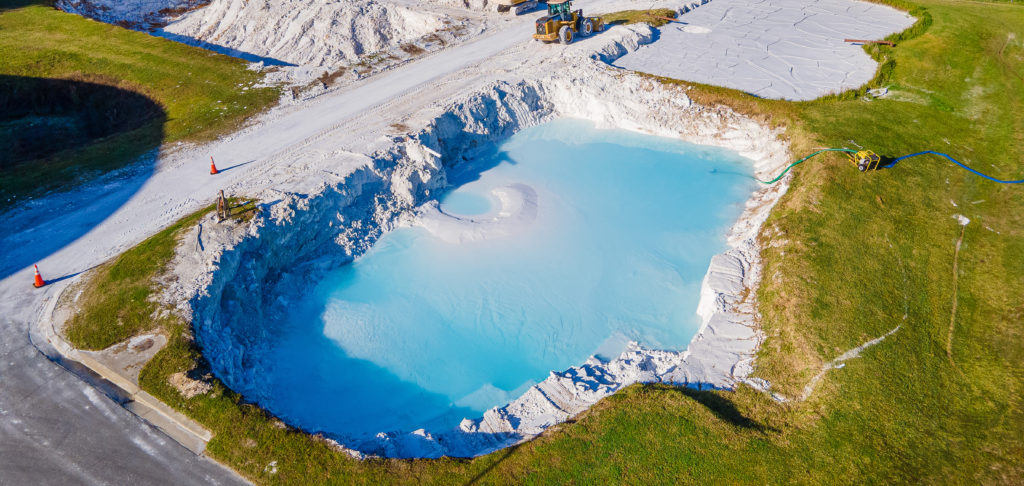 The City of Ocala’s Water Resources Conservation Coordinator Rachel Slocumb provides the public with educational facts on how much water we can conserve by implementing some easy changes into our daily routines.
The City of Ocala’s Water Resources Conservation Coordinator Rachel Slocumb provides the public with educational facts on how much water we can conserve by implementing some easy changes into our daily routines.
“Water is a finite resource,” Slocumb states.
She explains that city water
customers use about 12 million gallons of water a day, but that small changes by individuals can make a big impact.
“If you reduce your daily shower by one minute, you’re saving almost 1,000 gallons of water a year,” she reveals. “Shut the water off while you’re washing your face,” she suggests. “That’s 4 gallons of water a day if you wash your face twice.”
Since half the water used in Ocala is for irrigation, that means people are using 6 million gallons of water every day not for drinking or bathing, but in the pursuit of a greener lawn. Slocumb urges residents to consider whether irrigation is necessary and to be mindful of automatic irrigation systems, which might be timed to water the lawn even after it rains, and to consider Florida-friendly landscaping.
“So often, people think their actions don’t matter,” she shares. “Making small steps and small shifts in your behavior make a huge environmental impact over time.”
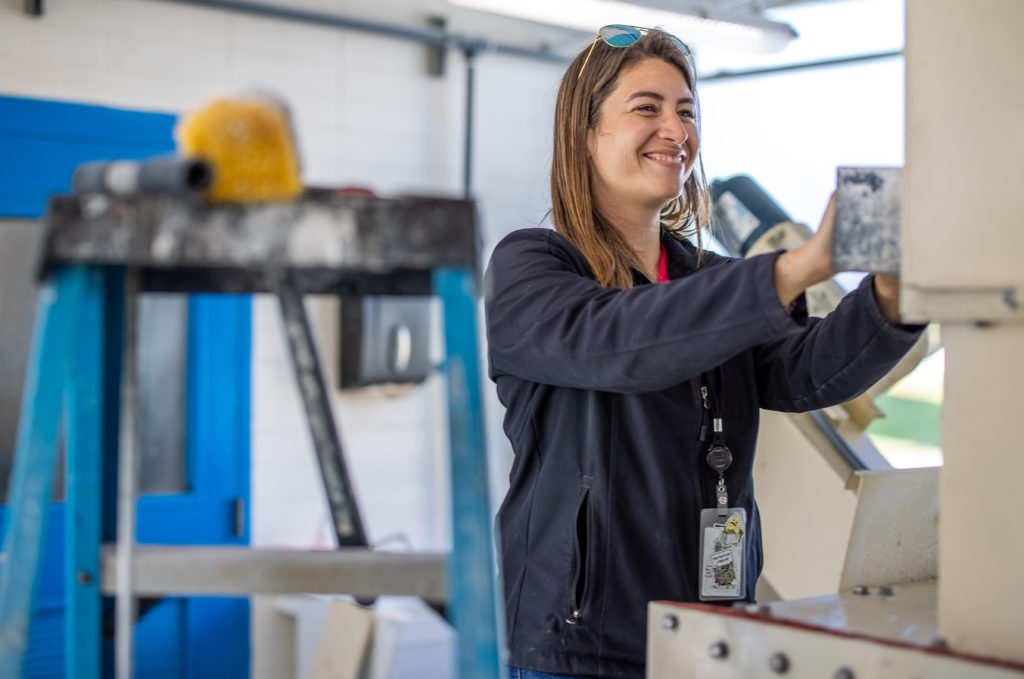 Slocumb partnered with Amanda Marek, the UF/IFAS Marion County Florida-friendly Landscaping Coordinator, to create a demonstration garden at WTP#1, which showcases more than two dozen plant varieties, including crowngrass, pentas, holly, anise, liriope, juniper, firegrass and magnolias, all of which are flourishing despite not being watered since they were planted 3 1/2 years ago.
Slocumb partnered with Amanda Marek, the UF/IFAS Marion County Florida-friendly Landscaping Coordinator, to create a demonstration garden at WTP#1, which showcases more than two dozen plant varieties, including crowngrass, pentas, holly, anise, liriope, juniper, firegrass and magnolias, all of which are flourishing despite not being watered since they were planted 3 1/2 years ago.
“Homeowners can save a considerable amount of water and money by implementing just a few simple Florida-friendly landscaping practices,” Marek explains. “These can include selecting plants that are hardy in our zone, that are drought tolerant and that won’t outgrow the space they’re given.”
And homeowners don’t necessarily have to make massive changes to their landscape to make it Florida-friendly, she notes.
“It can be as simple as shutting off some irrigation zones to plants that no longer need it,” she says, “or making sure they’re only fertilizing their lawns when the grass is actively growing.”
Residents and landscape professionals who learn Florida-friendly landscaping techniques through UF/IFAS Marion County’s classes save approximately 5 million gallons of water every year, Marek reveals.
Sharing the Science
Due to current conditions, tours are not available at the Water Treatment Plant, but if you would like to know more about water conservation and aquifer protection, please visit the Ocala Wetland Recharge Park at 2105 NW 21st Street.
 “In previous years we would give around 30 to 50 tours annually,” says Slocumb, who especially enjoys leading young people onto the catwalks above the water tanks to show them all the interesting scientific processes, such as how the liquid carbon dioxide used to maintain pH makes the water bubble and how the lime used to soften the water creates heat.
“In previous years we would give around 30 to 50 tours annually,” says Slocumb, who especially enjoys leading young people onto the catwalks above the water tanks to show them all the interesting scientific processes, such as how the liquid carbon dioxide used to maintain pH makes the water bubble and how the lime used to soften the water creates heat.
“There’s a lot of exciting stuff!” declares Slocumb, who admits she gets passionate about water and water conservation.
“It’s a labor of water love,” she says with a smile.
To schedule a water education presentation, call Rachel Slocumb at (352) 351-6774.
Easy Water Conservation Tips
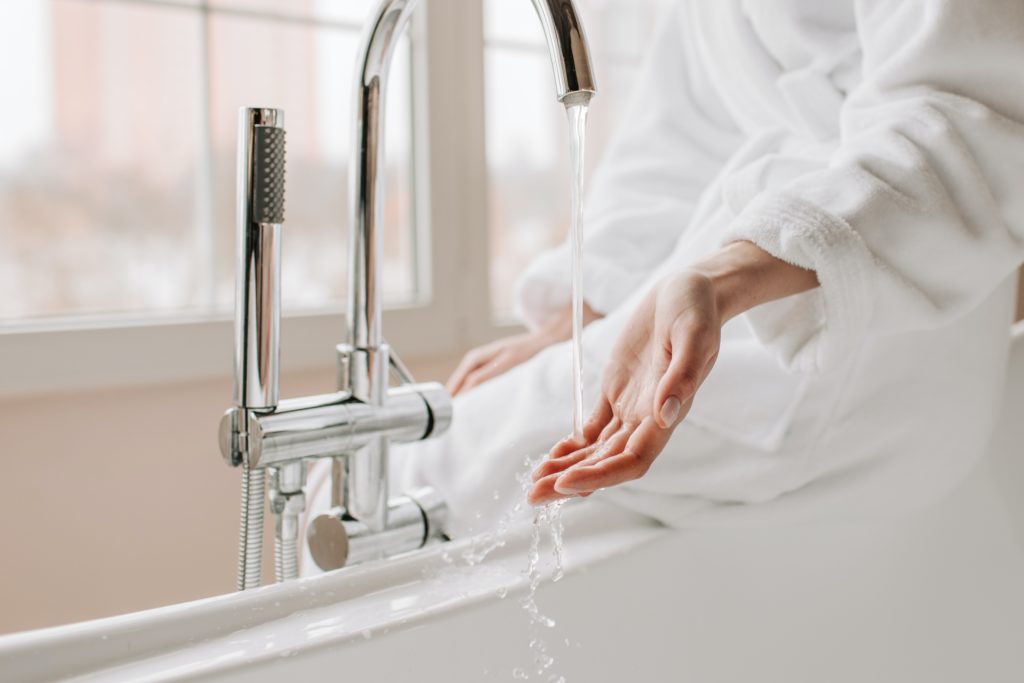 April is Water Conservation Month in Florida. Here are some easy ways you can reduce your use.
April is Water Conservation Month in Florida. Here are some easy ways you can reduce your use.
- Turn off the water while you brush your teeth. You can save 3,212 gallons per year.
- Shorten your daily shower by just one minute to save more than 900 gallons a year.
- Choose showers over baths. Taking a five-minute shower rather than a bath can save more than 16,000 gallons per year.
- Use your dishwasher. This can save 50 gallons over handwashing every time you do dishes.
- Fix leaky toilets. A leaky flapper can waste up to 200 gallons per day.
- Fix leaky faucets. A slow but steady drip can waste more than 24,000 gallons in a month.
- Use your outdoor hose only when needed. Turn it off while washing your car and use a broom to clean walkways rather than your hose—it uses 17 gallons per minute.
- Consider replacing older appliances. A new, efficient washing machine uses about a third as much water as older models. Replacing an older toilet can save 900 gallons of water per person, per year and installing a more efficient showerhead can save nearly 3,300 gallons per year.
- Water your lawn only when needed and follow the irrigation ordinance, watering no more than twice per week according to your address number. Don’t irrigate between 10am-4pm or on hot days.
- Waiting for the water to get hot? Collect that water in a bucket to water plants and pets.
- Drink tap water instead of bottled water. Keep a pitcher in the refrigerator for a cold, refreshing drink—every 20-ounce bottle of water takes 1.5 gallons to produce.
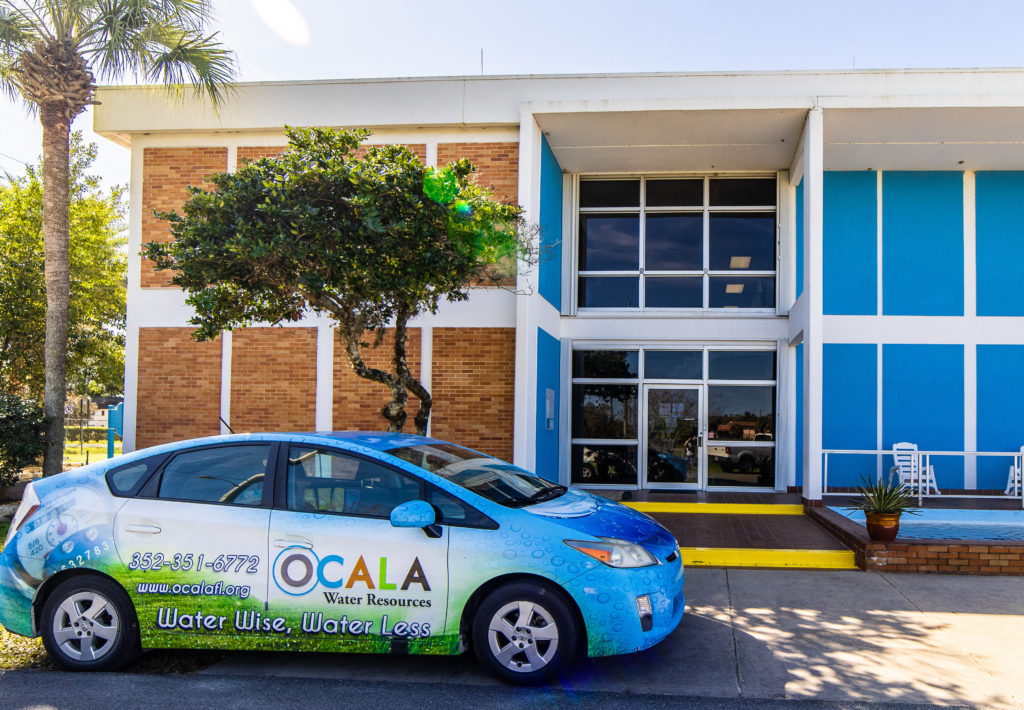 For more information about the City of Ocala Water Resources, visit ocalafl.org/government/city-departments/water-resources. For more information about Florida-friendly landscaping, visit https://sfyl.ifas.ufl.edu/lawn-and-garden/florida-friendly-landscaping
For more information about the City of Ocala Water Resources, visit ocalafl.org/government/city-departments/water-resources. For more information about Florida-friendly landscaping, visit https://sfyl.ifas.ufl.edu/lawn-and-garden/florida-friendly-landscaping
The City of Ocala Water Resources is sponsoring a series of conservation-themed films this month at the historic Marion Theatre. Conservation Coordinator Rachel Slocumb will introduce the films at some showings to tell you how the city is marking Water Conservation Month.
Chasing Coral (Free admission)
This Netflix documentary explores the threats to our quickly disappearing coral reefs.
Thursday, April 1 at 5:30 PM
Saturday, April 10 at 5:15 PM*
Soylent Green (tickets $5 at the door or mariontheatre.org)
A 1973 cult classic featuring Charlton Heston in a dystopian thriller about an America in ecological disaster.
Thursday, April 8 at 5:30 PM*
Friday, April 16 at 2:30 PM
Tarzan the Ape Man (tickets $5 at the door or mariontheatre.org)
This 1932 film starring Johnny Weissmuller grossed over $1 million and was filmed in part at Silver Springs.
Saturday, April 17 at 2 PM
Friday, April 23 at 2:30 PM
Saturday, April 24 at 2:00 PM
Thursday, April 29 at 5:30 PM*
*Rachel Slocumb will introduce the indicated screenings and free popcorn will be provided courtesy of Water Resources.






